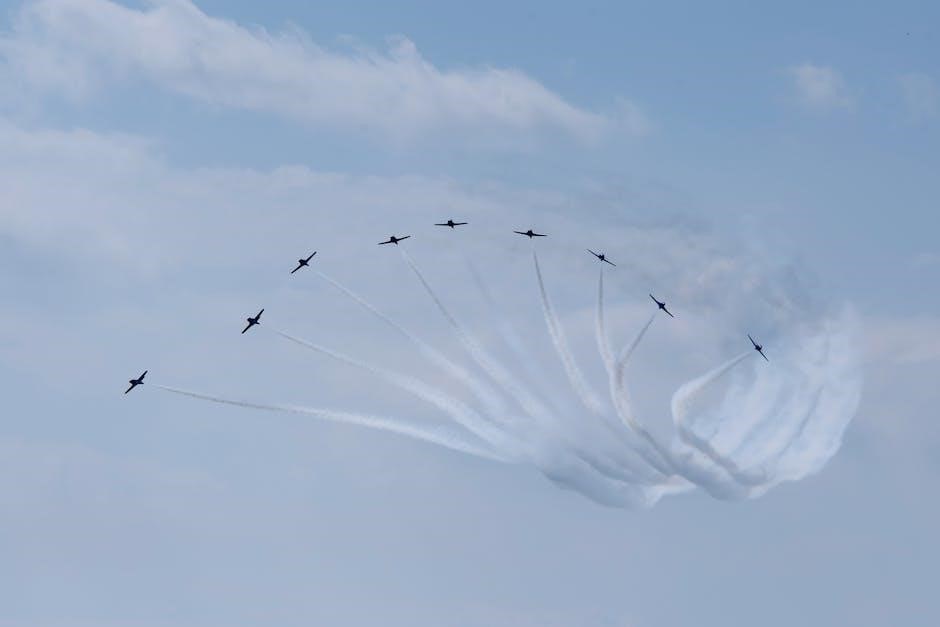The Air Force NCO Charge is a cornerstone document outlining the responsibilities and expectations of noncommissioned officers, emphasizing leadership, integrity, and service. It signifies the transition from enlisted to leadership roles, aligning with Air Force priorities and fostering a culture of excellence and accountability.
1.1 Overview of the NCO Charge Document
The Air Force NCO Charge document is a foundational guide outlining the roles, responsibilities, and expectations for noncommissioned officers. It serves as a formal declaration of the transition from junior enlisted to NCO status, emphasizing leadership, mentorship, and operational excellence. The document is structured to inspire professionalism, integrity, and service, aligning NCOs with the Air Force’s core values. It includes a preamble setting the tone, core tenets highlighting key principles, and a conclusion reinforcing commitment to the mission. The NCO Charge is a critical resource for developing leaders who embody the Air Force’s standards of conduct and excellence.
1.2 Importance of the NCO Charge in Air Force Leadership
The NCO Charge is vital to Air Force leadership as it establishes the framework for noncommissioned officers to lead effectively. It underscores the shift from individual contributor to leader, emphasizing mentorship and accountability. By aligning with core values of integrity, service, and excellence, the Charge ensures NCOs are prepared to meet mission demands. It fosters a culture of professionalism, ethical decision-making, and strategic alignment with Air Force priorities. The Charge serves as a guiding document, empowering NCOs to inspire and guide their teams, making it indispensable for maintaining unit cohesion and achieving operational success.

Historical Context of the NCO Charge
The NCO Charge traces its roots to the early 20th century, evolving alongside the Air Force’s establishment in 1947. It formally emerged in the 1980s, reflecting the growing professionalization of NCO leadership and its critical role in mission success.
2.1 Evolution of NCO Leadership in the U.S. Air Force
The evolution of NCO leadership in the U.S. Air Force reflects a journey from technical expertise to strategic leadership. Early years emphasized technical proficiency, but post-WWII shifts highlighted the need for NCOs to lead and mentor effectively. The 1960s and 1970s saw formalized leadership training, while the 1980s introduced the NCO Charge, solidifying their role as leaders and mentors. Modern NCOs are expected to align with Air Force priorities, uphold ethical standards, and drive operational excellence, as highlighted in recent updates to the Charge, ensuring they remain the backbone of the force.
2.2 Key Milestones in the Development of the NCO Charge
The NCO Charge has undergone significant development over the years, with key milestones shaping its purpose and content. Initially established to formalize NCO responsibilities, it evolved to reflect the Air Force’s growing emphasis on leadership and mentorship. The 1980s marked a pivotal era with the introduction of the Charge as a formal document, highlighting core values like integrity, service, and excellence. Recent updates have aligned the Charge with modern Air Force priorities, emphasizing strategic leadership and ethical decision-making. These milestones underscore the Charge’s adaptability to the changing needs of the Air Force, ensuring NCOs remain central to the organization’s success and mission achievement.

Structure of the NCO Charge Document
The NCO Charge document is structured to clearly outline responsibilities and expectations, beginning with a preamble that sets the tone, followed by core tenets emphasizing integrity, service, and excellence, and concluding with a reaffirmation of commitment to the Air Force mission.
3.1 Preamble: Setting the Tone for NCO Responsibilities
The preamble of the NCO Charge serves as the foundational introduction, establishing the expectations and values for noncommissioned officers. It emphasizes the transition from enlisted to leadership roles, highlighting the importance of integrity, service, and excellence. This section sets the tone by outlining the responsibilities NCOs must uphold, including leadership, mentorship, and maintaining the highest ethical standards. It inspiring commitment to the Air Force mission and fostering a culture of accountability and professionalism. The preamble ensures NCOs understand their role as leaders and their duty to embody the core values of the Air Force.
3.2 Core Tenets: Integrity, Service, and Excellence
The NCO Charge emphasizes three core tenets: Integrity, Service, and Excellence. Integrity demands unwavering adherence to moral principles, ensuring trust and credibility in leadership. Service highlights the commitment to selflessness, prioritizing the mission and the well-being of others. Excellence requires NCOs to strive for superior performance in all duties, fostering a culture of continuous improvement. These tenets are intertwined, guiding NCOs in their decision-making and actions. They serve as the foundation for professional conduct, ensuring NCOs lead by example and uphold the highest standards of the Air Force. These principles are essential for maintaining unit cohesion and achieving mission success.
3.3 Conclusion: Commitment to the Air Force Mission
The conclusion of the NCO Charge reaffirms the NCO’s unwavering commitment to the Air Force mission. It underscores the responsibility to lead by example, fostering a culture of accountability and excellence. NCOs are charged to inspire and motivate their teams, ensuring the successful execution of operations. This commitment extends beyond individual duties, encompassing the broader goals of the Air Force. The document concludes by emphasizing the NCO’s role in maintaining high standards of performance and ethical conduct, ensuring the Air Force remains a formidable force. Through this commitment, NCOs play a vital role in safeguarding the nation’s interests and upholding the Air Force’s legacy of excellence.

Key Elements of the NCO Charge
The NCO Charge emphasizes leadership, mentorship, and strategic alignment with Air Force priorities. It highlights ethical standards, professional conduct, and operational excellence, ensuring mission success and accountability.
4.1 Leadership and Mentorship Responsibilities
NCOs are entrusted with fostering a culture of excellence, guiding airmen through mentorship and professional development. They lead by example, inspiring integrity and accountability while aligning actions with Air Force priorities. Mentorship is a cornerstone, ensuring subordinates achieve their potential and contribute effectively to the mission. NCOs must cultivate trust, communicate clearly, and make decisions that reflect ethical standards. Their role extends beyond supervision, focusing on empowering teams to overcome challenges and achieve operational success. Effective leadership and mentorship are vital to maintaining unit cohesion, driving innovation, and upholding the Air Force’s core values.
4.2 Strategic Alignment with Air Force Priorities
NCOs must align their leadership and decision-making with Air Force strategic priorities, ensuring actions support the mission and core values. This involves understanding and implementing policies that drive operational effectiveness, fostering innovation, and maintaining readiness. Strategic alignment requires NCOs to communicate priorities clearly, ensuring teams understand their role in achieving broader goals. By integrating these priorities into daily operations, NCOs help sustain the Air Force’s competitive edge. Their ability to translate strategy into actionable guidance is critical for mission success and maintaining the trust of subordinates and superiors alike.
4.3 Ethical Standards and Professional Conduct
Ethical standards and professional conduct are fundamental to NCO leadership, as outlined in the Air Force NCO Charge. NCOs must adhere to the core values of Integrity First, Service Before Self, and Excellence in All We Do. This includes upholding the Uniform Code of Military Justice, maintaining high moral character, and fostering a culture of respect and accountability. Ethical decision-making is crucial, ensuring actions align with Air Force policies and promote trust within the organization. Professional conduct extends to mentorship, where NCOs set the example for junior personnel, reinforcing the importance of ethical behavior in all aspects of service.
4.4 Operational Excellence and Mission Achievement
Operational excellence is a cornerstone of the Air Force NCO Charge, emphasizing the importance of achieving mission success through effective leadership and precision. NCOs are tasked with fostering a culture of continuous improvement, ensuring that all tasks align with strategic objectives. They must lead by example, prioritizing efficiency, innovation, and teamwork to meet operational demands. The Charge underscores the responsibility of NCOs to mentor subordinates, enhancing their skills to contribute to mission readiness. By maintaining high standards and a commitment to excellence, NCOs ensure the Air Force remains a dominant force, capable of overcoming challenges and securing national security interests.

The Role of NCOs in the Air Force
NCOs serve as leaders, mentors, and the backbone of the Air Force, providing guidance, fostering professionalism, and ensuring mission success through dedication and expertise.
5.1 Transition from Junior Enlisted to NCO
The transition from junior enlisted to NCO marks a significant career milestone, shifting focus from individual tasks to leadership and mentorship. NCOs embrace heightened responsibilities, guiding airmen toward mission success and embodying Air Force values. This shift requires a commitment to professional growth, ethical decision-making, and fostering a culture of excellence. The NCO Charge emphasizes the importance of this transition, as NCOs become the backbone of the Air Force, ensuring operational effectiveness and upholding the highest standards of integrity and service. This role evolution is crucial for maintaining unit cohesion and achieving strategic objectives, making NCOs indispensable to the Air Force’s success.

5.2 NCOs as the Backbone of the Air Force
NCOs are the backbone of the Air Force, entrusted with ensuring mission success through leadership, mentorship, and adherence to core values; They serve as role models, fostering a culture of excellence and accountability. NCOs are responsible for training and developing junior airmen, upholding standards, and maintaining unit cohesion. Their expertise and judgment are vital in executing operations and making strategic decisions. As the primary link between senior leaders and enlisted personnel, NCOs play a pivotal role in communicating vision and guiding teams toward achieving Air Force objectives. Their dedication and professionalism are essential to sustaining the Air Force’s operational effectiveness and global readiness.
5.3 Leadership Challenges and Opportunities
NCOs face unique challenges in balancing mentorship, operational demands, and strategic alignment with Air Force priorities. They must navigate evolving mission requirements, technological advancements, and changing workforce dynamics. These challenges offer opportunities to innovate and adapt, fostering resilience and growth. NCOs are tasked with maintaining high ethical standards while leading diverse teams, ensuring inclusivity and addressing individual needs. Effective communication and decision-making are crucial in resolving conflicts and fostering collaboration. By embracing these challenges, NCOs can enhance their leadership skills, contribute to mission success, and shape the future of the Air Force. Their ability to adapt and lead will remain vital in addressing emerging global threats and maintaining operational readiness.
Legal and Ethical Considerations
The NCO Charge emphasizes adherence to the Uniform Code of Military Justice (UCMJ) and ethical decision-making, ensuring NCOs uphold legal standards and maintain professional integrity in leadership roles.
6.1 Adherence to the Uniform Code of Military Justice (UCMJ)
NCOs are required to adhere strictly to the Uniform Code of Military Justice (UCMJ), which governs military law and discipline; The NCO Charge emphasizes the importance of understanding and complying with these legal standards, ensuring that NCOs conduct themselves in a manner that upholds the integrity of the Air Force. This includes following rules of conduct, reporting violations, and maintaining accountability. Recent court-martial cases, such as those involving Senior Master Sgt. Nicholaus Stopher and Cadet Everett Smalley, highlight the legal scrutiny NCOs face and the consequences of non-compliance. Adherence to the UCMJ is essential for maintaining trust and discipline within the ranks.
6.2 Ethical Decision-Making in Leadership Roles
Ethical decision-making is a cornerstone of NCO leadership, as outlined in the NCO Charge. NCOs are expected to embody Air Force core values, including integrity, service, and excellence, when making decisions. The document emphasizes the importance of moral judgment and accountability, particularly in complex situations. Recent cases, such as the court-martial of Senior Master Sgt. Nicholaus Stopher, highlight the consequences of unethical behavior. NCOs must consistently demonstrate ethical conduct, fostering trust and respect within their units. Ethical leadership not only upholds the Air Force’s reputation but also ensures mission success and the well-being of personnel. This principle is non-negotiable in the NCO Charge.
Recent Developments and Updates
Recent updates to the NCO Charge reflect evolving Air Force priorities, including modernization and ethical standards. Policy changes address leadership challenges, ensuring alignment with mission requirements and accountability.
7.1 Changes in NCO Charge Policies and Procedures
Recent updates to the NCO Charge policies emphasize enhanced leadership accountability and ethical standards. New procedures address modern challenges, such as combating misconduct and fostering inclusive environments. The Air Force has introduced stricter guidelines on hazing and bullying, aligning with broader military reforms. Additionally, there is a focus on improving transparency in legal processes, particularly in court-martial cases involving NCOs. These changes reflect the Air Force’s commitment to maintaining trust and integrity within its ranks. Revised mentorship programs and leadership training protocols have also been implemented to ensure NCOs are equipped to meet evolving mission demands while upholding the highest ethical standards.
7.2 Impact of Modernization on NCO Leadership
Modernization has significantly influenced NCO leadership, requiring adaptability to emerging technologies and evolving mission demands. The integration of advanced systems, such as artificial intelligence and cyber operations, demands tech-savvy leaders. NCOs must now navigate complex operational environments while maintaining traditional leadership principles. The establishment of new units, like Space Delta 4, highlights the expanding roles of NCOs in space operations. Additionally, modernization efforts emphasize continuous learning and professional development to ensure NCOs remain proficient in cutting-edge skills. These changes underscore the necessity for NCOs to embrace innovation while fostering a culture of excellence and integrity, ensuring the Air Force remains competitive in a dynamic global landscape.

Case Studies and Examples
Case studies highlight real-life applications of the NCO Charge, such as court-martial outcomes for Senior Master Sgt. Nicholaus Stopher and Cadet Everett Smalley, illustrating leadership challenges and accountability.
8.1 Court-Martial Cases Involving NCOs
Court-martial cases involving NCOs, such as Senior Master Sgt. Nicholaus Stopher, highlight the legal and ethical challenges faced by leadership. These cases often involve charges of misconduct, emphasizing the importance of adhering to the Uniform Code of Military Justice (UCMJ). The dismissal of charges against a senior enlisted leader due to prosecutorial issues underscores the complexity of military justice. Such cases serve as examples of how NCOs must navigate legal frameworks while maintaining ethical standards, reflecting the gravity of their responsibilities and the consequences of failing to uphold them. These instances are critical for understanding leadership accountability.
8;2 Notable NCOs and Their Contributions to the Air Force

Notable NCOs have left an indelible mark on the Air Force through their exceptional leadership, mentorship, and dedication to the mission. Many have risen through the ranks, exemplifying the core values of integrity, service, and excellence. These individuals often lead by example, inspiring junior personnel and fostering a culture of professionalism. Their contributions range from developing innovative training programs to excelling in critical operational roles. By embodying the principles outlined in the NCO Charge, they demonstrate the vital role NCOs play in maintaining unit cohesion and achieving strategic goals. Their stories serve as motivation for future leaders, highlighting the impact of committed and ethical leadership.

Training and Professional Development
Continuous learning and mentorship are essential for NCOs to excel in leadership roles, fostering a culture of excellence and readiness within the Air Force.
9.1 NCO Professional Military Education (PME)
NCO Professional Military Education (PME) is a critical component of leadership development, ensuring NCOs are equipped with the knowledge and skills to lead effectively. Through structured courses and practical training, PME fosters strategic thinking, operational excellence, and ethical decision-making. It aligns with the Air Force’s mission priorities, preparing NCOs to meet current and future challenges. PME programs are designed to enhance leadership capabilities, ensuring NCOs can mentor subordinates and contribute to the Air Force’s success. Continuous education is vital for maintaining a skilled and adaptable force, enabling NCOs to uphold the highest standards of professionalism and integrity.
9.2 Mentorship Programs for NCOs
Mentorship programs for NCOs play a vital role in fostering professional growth and leadership development. These programs connect experienced NCOs with junior personnel, promoting the sharing of knowledge and best practices. By providing guidance and support, mentors help shape the next generation of leaders, ensuring continuity of excellence within the Air Force. Mentorship also enhances career advancement by aligning personal goals with Air Force priorities. Through structured mentorship initiatives, NCOs can develop essential skills, address challenges, and maintain high standards of professionalism. Such programs are integral to building a resilient and motivated force capable of achieving the Air Force’s mission.
The Air Force NCO Charge is a foundational document guiding NCOs in leadership, integrity, and service. It underscores their crucial role in mission success and professional development, ensuring excellence and accountability. As the Air Force evolves, the NCO Charge remains vital for shaping future leaders.
10.1 The Future of NCO Leadership in the Air Force
The future of NCO leadership in the Air Force lies in fostering strategic thinkers who can navigate modernization and global challenges. NCOs will be expected to embody the core values of integrity, service, and excellence while leading with innovation. Professional development programs and mentorship will remain critical in preparing NCOs for advanced responsibilities. The Air Force will continue to rely on NCOs to inspire and guide airmen, ensuring operational excellence and mission success. By aligning with evolving priorities, NCOs will play a pivotal role in shaping the force’s future, upholding ethical standards, and driving the Air Force toward new heights of achievement and readiness.

10.2 Final Thoughts on the NCO Charge and Its Significance
The NCO Charge serves as a foundational guide, instilling leadership principles and ethical standards in Air Force NCOs. It underscores the importance of mentorship, accountability, and alignment with Air Force priorities. By adhering to the Charge, NCOs not only honor their commitment to the mission but also foster a culture of excellence and integrity. The document’s enduring relevance ensures that NCOs remain the backbone of the Air Force, driving operational success and inspiring future generations. Its significance lies in its ability to adapt to evolving challenges while maintaining core values, ensuring NCOs continue to lead with purpose and distinction.
